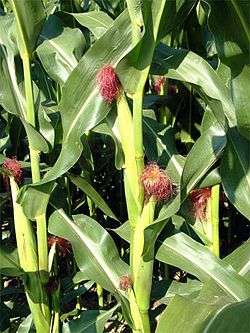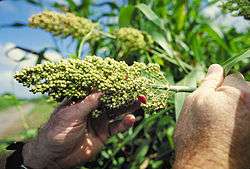Definify.com
Definition 2026
唐黍
唐黍
Japanese
Pronunciation
- (Irregular reading)
- (Tokyo) もろこしきび [mòrókóshí kíꜜbì] (Nakadaka - [5])
- IPA(key): [mo̞ɺ̠o̞ko̞ɕi kʲibi]
Alternative forms
Noun
唐黍 (hiragana もろこしきび, romaji morokoshi kibi)
Usage notes
The longer term morokoshi kibi has been largely replaced by the shorter form morokoshi below.
Synonyms
Etymology 2

唐黍 (morokoshi, tōkibi): maize.
| Kanji in this term | |
|---|---|
| 唐 | 黍 |
| Grade: S | Hyōgaiji |
| Irregular | |
Abbreviation of morokoshi kibi above, with the abbreviated reading then re-applied to the entire kanji compound.[1]
Pronunciation
Alternative forms
Noun
唐黍 (hiragana もろこし, romaji morokoshi)
- sorghum
- maize, corn (especially corn on the cob)
Synonyms
- (sorghum): 蜀黍 (morokoshi), 唐黍 (morokoshi), 唐黍 (tōkibi), 高黍 (takakibi)
- (maize): 玉蜀黍 (tōmorokoshi), 唐黍 (tōkibi)
Usage notes
The term 玉蜀黍 (tōmorokoshi) is more common for the maize sense.
Etymology 3
| Kanji in this term | |
|---|---|
| 唐 | 黍 |
|
とう Grade: S |
きび Hyōgaiji |
| jūbakoyomi | |
/taukibi/ → /tɔːkibi/ → /toːkibi/
Compound of 唐 (tō, “Tang Dynasty; China in general; (by extension) foreign”) + 黍 (kibi, “millet”).[1][2]
Pronunciation
- Jūbakoyomi
- (Tokyo) とうきび [tòókíꜜbì] (Nakadaka - [3])[2]
- IPA(key): [to̞ːkʲibi]
Noun
唐黍 (hiragana とうきび, romaji tōkibi)
- maize, corn (especially corn on the cob)
- sorghum
